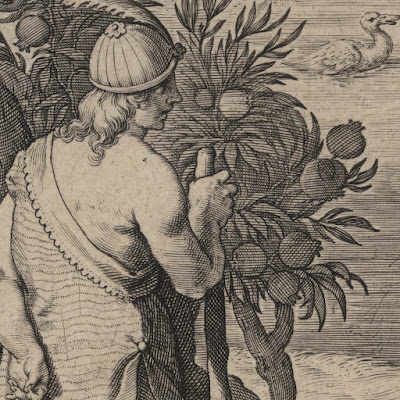Cornelis Galle I (1576–1650)
“Indians catching ducks with pumpkins”
(aka “Jacht op eenden”; “Hunting Ducks”), 1578, plate 95 from the second series
of 104 plates, “Hunting Parties” (aka “Venationes Ferarum, Avium, Piscium”
(transl. “With wild beasts, birds, fish”), after Jan van der Straet (aka
Joannes Stradanus; Ioannes Stradanus) (1523–1605) published by Cornelis Galle’s
son, Ioan Galle (aka Jan Galle; Joannes Galle; Johann Galle; Ioannes
Galle; Joan Galle) (1600–1676), in Antwerp.
This plate was added to the original set
of 43 engravings executed solely by Philips Galle—Cornelis Galle’s
father. Beyond Cornelis Galle, the later plates were executed by the following engravers:
A Collaert; J. Collaert; I and C. de Mallery (see http://www.britishmuseum.org/research/collection_online/collection_object_details.aspx?objectId=1619537&partId=1&people=93957&peoA=93957-2-70&page=1
and A Baroni & M Sellink, “Stradanus 1523–1605: Court artist of the
Medici”, exh.cat. Groeningemuseum Brugge 2008-2009, Turnhout, 2012, pp.245–58,
cat. nos. 32–49).
Engraving on chine collé (China) on fine
laid paper with margins from a late printing.
Size: (sheet) 26.5 x 36.2 cm; (plate) 21
x 27.2 cm; (image borderline) 19.3 x 27 cm
Inscribed on plate within the image
borderline: (lower left) “Ioan. Stradanus inuent.”; (lower centre) “Corn. Galle
Sculp.”; (lower right) “Ioan. Galle excud.”
Note: the Metropolitan Museum of Art
proposes that this plate was executed by Jan Collaert I (c1530–1581) (see https://www.metmuseum.org/art/collection/search/393446?&searchField=All&sortBy=Relevance&ft=pumpkin&offset=20&rpp=20&pos=35),
but this attribution is unlikely as the plate is inscribed “Corn. Galle Sculp.”
The Rijksmuseum advises that the engraver is Cornelis Galle.
Numbered on plate below the image
borderline: (left) “95.”
Lettered on plate below the image
borderline in two columns of two lines of Latin text: “Anserum agreste genus
stagnante in aqua capit Indus. / Ipse cucurbità habet. Tec tum caput,
illecebrisque // Allicit: esuriens anser visæ inuolat escæ. / Indus pascentem
facili capit arte volucrem." (Google transl.: “Of geese in the water, it
takes an Indian race of rustics, forms a stagnant lake. / He has a pumpkin.
Then head to the roof, the baits // attracts hungry unimaginable gets goose
meat. / Indian food to easily capture birds.")
State: iv (of iv) with the change of
publisher from Philips Galle to Ioan Galle and change of the plate number.
New Hollstein 485 (Stradanus) (Leesberg Marjolein
[comp.] 2008, “The new Hollstein: Dutch and Flemish etchings, engravings and
woodcuts 1450–1700: Johannes Stradanus”, vol. 3, Amsterdam, Sound and Vision
Rijksmuseum, p.184; p.210 [afb.], cat. no. 485).
The Rijksmuseum offers the following
description of this print from the earlier edition published by Philips Galle:
“Indians catch ducks in a pond. Indians
camouflage themselves and hide in the water through a hollowed-out pumpkin.
Wild ducks sit on the pumpkins and are easy prey. The print has a Latin caption
and is part of a series about hunting scenes.”
Condition: richly inked and near faultless
late impression in excellent condition (i.e. there are no tears, holes, folds,
abrasions, significant stains or foxing). The sheet is laid onto a support of
conservator’s fine archival/millennium quality washi paper.
I am selling this superb late impression
of this rare engraving, for a total cost of AU$244 (currently US$171.81/EUR154.01GBP133.02
at the time of this listing) including postage and handling to anywhere in the
world.
If you are interested in purchasing this
fascinating print showing a fascinating way early Indians caught waterfowl—especially
ducks—please contact me (oz_jim@printsandprinciples.com) and I will send you a
PayPal invoice to make the payment easy.
This print has been sold










No comments:
Post a Comment
Please let me know your thoughts, advice about inaccuracies (including typos) and additional information that you would like to add to any post.